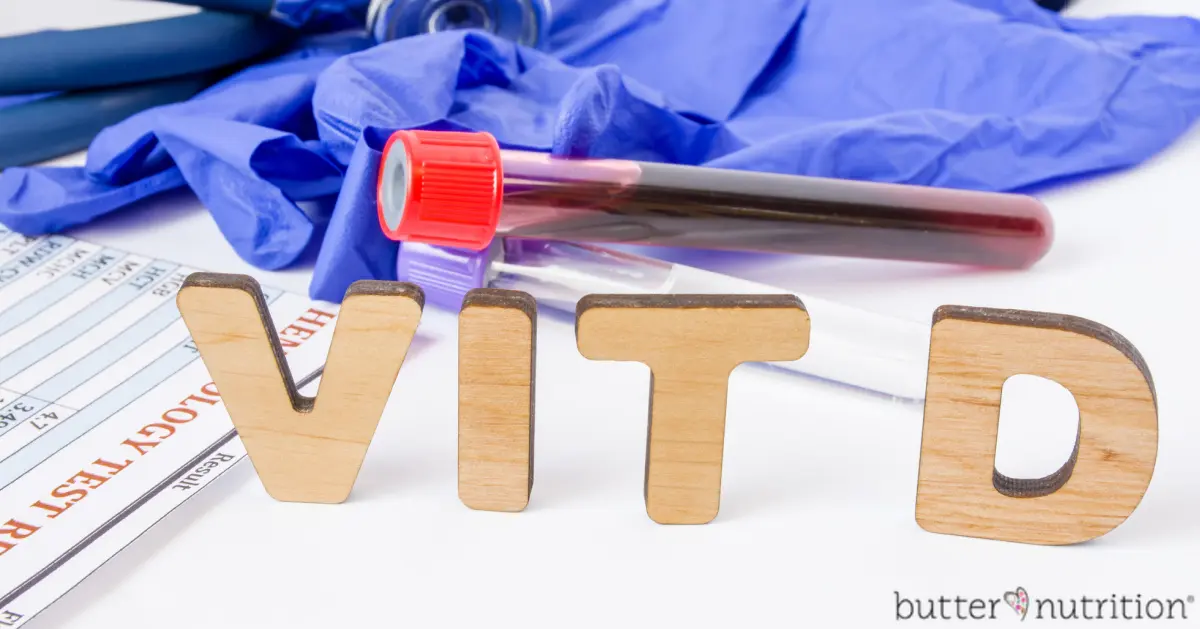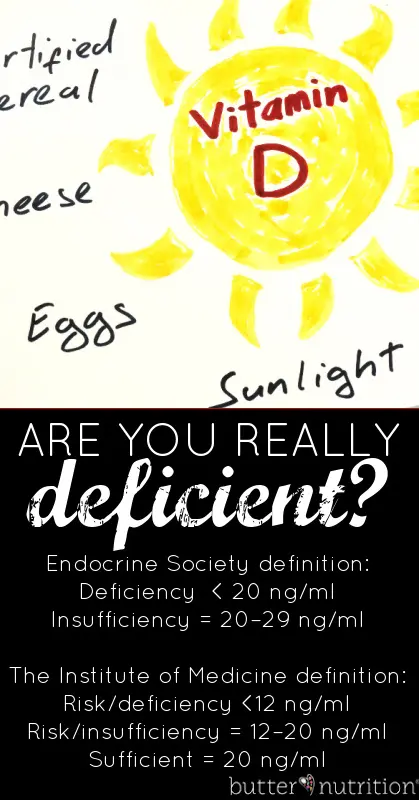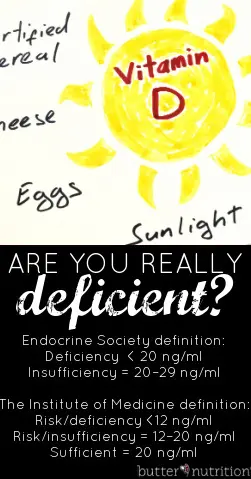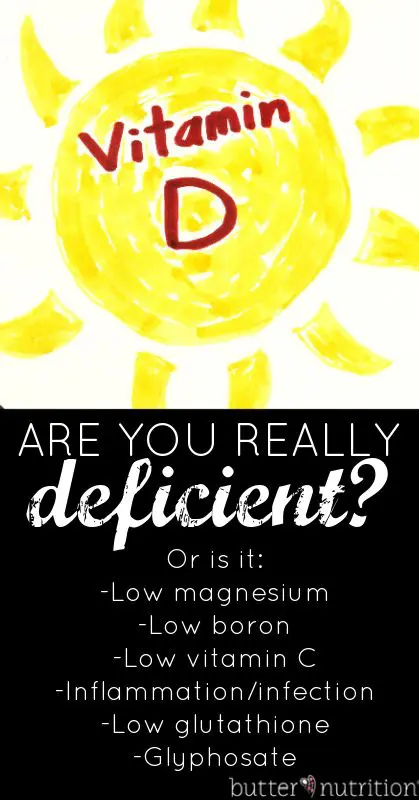
But there are problems. Major problems, that no-one is talking about. Till now.
Problem #1 — The deficiency ranges:
What even classifies vitamin D deficiency? The answer varies, in short, It depends on who you talk to. Some of the biggest authorities wildly disagree:
Problem #2 — Reasons vitamin D can be low that don't stem from not enough vitamin D:
- Low magnesium [2]
- Low boron [3]
- Low vitamin C [4]
- Inflammation/infection — as someone who tests gut bacteria, I can tell you gut infections are extremely common. In these cases the ‘storage form’ of vitamin D is often low, but the active form is high (which is not typically tested). [1]
- Low glutathione [7]
- Glyphosate (i.e. Roundup, GMOs, non-organic food) [6]
- Favorable gut bacteria conditions (i.e. healthy guts) [5]
- Normal seasonal variations (i.e. vitamin D levels will be the highest after sunny summer months and fall during the winter, or darker months)
I believe these reasons are why so many people are supplementing only to *not see* levels easily come up. They are hitting the wrong nail with their hammer.
Additionally, automatically sprinkling ‘high dose vitamin D supplements’ on everyone who has low serum D is NOT the answer and can do harm in some cases. Bringing us to the next problem...
Problem #3 —The side effects:
Mega-dosing any vitamin supplement can have side effects, but this is especially true for fat soluble vitamins that are stored in the body and cannot quickly leave. Vitamin D is stored in your fat cells and subject to toxicity. You can’t just pee it out when you get too much.
Vitamin D has well-known side effects and is used as a potent rat poison for those very reasons.
According to a 2022 report entitled: Vitamin D toxicity due to self-prescription: A case report, the general population is unaware of the risks: "People are taking vitamin D orally or intramuscularly in mega doses as a supplement without adequate medical monitoring and indication. This leads to vitamin D toxicity causing hypercalcemia, acute kidney injury, and altered sensorium. Vitamin D is fat-soluble and remains in the body for long time and is released slowly. People are not aware of this phenomenon." [8]
A few important markers for vitamin D supplementation are as follows:
- The upper limit is 4,000iu per the NIH [9]
- The Endocrine Society recommends 1,500-2,000iu
- Some research says adverse effects can start at 3,800iu [10]
- Personally I see anything over 1,000-2,000iu impacting hair tissue mineral levels in the following ways:
- Increased calcium levels (calcium slows things down in the body)
- Decreased potassium levels
- This disrupts mineral patterns in a significant way and can impact your thyroid's ability to do its job. A disrupted calcium:potassium ratio can look like:
- fatigue
- brain fog
- low body temperature
- blood sugar issues (hypoglycemia)
-
sluggish digestion
-
sluggish thyroid
As someone who tests mineral levels using hair tissue mineral analysis on clients worldwide, I see calcium levels creep up in a dose-dependent manner in relation to vitamin D supplement intake (dose and duration determine with how elevated calcium gets), along with other non-vitality supporting mineral changes.
Problem #4: High doses were not intended to be taken orally
I never see high calcium levels from people getting vitamin D from the sun. It's always supplement sources. What does that tell us?
Vitamin D from the sun and oral supplements do not act identically in the body.
It is also very hard to find high amounts of oral vitamin D in nature. Nearly impossible to get close to 'supplement levels' consistently.
For instance, one of the top food sources for vitamin D is wild salmon. You'd have to eat 1 pound of salmon every day to get approximately 2,384iu of vitamin D from food. If you tried doing that every day, you'd put yourself at risk of mercury toxicity pretty quickly.
This is common in nature. It's hard to find large amounts of fat soluble vitamins (those being A, D, E & K) that are stored in the body for a reason.
Some may think nature's 'trying to kill you,' while I believe nature is communicating a message and trying to keep you alive.
So the bigger question is — what is nature trying to tell you? Perhaps vitamin D is meant to be part of chemical reaction that happens on the skin and largely not absorbed through the oral route (without risking side effects long term). Trying to 'outsmart' nature with supplement after supplement never works in the long term from what I've seen in my nutrition practice.
Next Steps
PIN IT:
-
https://www.ncbi.nlm.nih.gov/pmc/articles/PMC4160567/
-
https://www.sciencedaily.com/releases/2018/12/181214093837.htm
-
https://www.ncbi.nlm.nih.gov/pmc/articles/PMC4712861/
-
https://www.ncbi.nlm.nih.gov/pubmed/2170601
-
https://www.nature.com/articles/s41467-020-19793-8
-
https://myersdetox.com/transcript-166-glyphosate-and-how-to-detox-it-with-dr-stephanie-seneff/
-
https://www.ncbi.nlm.nih.gov/pmc/articles/PMC6208166/
- https://www.ncbi.nlm.nih.gov/pmc/articles/PMC9067206/
- https://ods.od.nih.gov/factsheets/VitaminD-Consumer/
- https://link.springer.com/article/10.1007/s40520-020-01678-x








The Bigger Universe
this is simply too stoopid for words. Hope you're getting paid by some big evil corporation. Fluff advice like this is a dime a dozen, Stop distracting ppl from real issues with this crap.
Gerald
Also Vitamin D can be low from glyphosate disruption of enzymes in the liver that are essential for activating vitamin D, correct?
Catherine
Yes, according to Dr. Stephanie Seneff.
Abundantly,
Catherine
Gerald
Thank you, I find your content as being well informed.
Cathleen
Thank you for this information!!!!!!! That is exactly what is happening in my body. Along with many other issues but High calcium, low potassium and taking vitamin D as directed by a doctor 🙃 Thank you!!!!!!!
Mary
Were the studies conducted using K2 along with D3? I remember as a patient of a naturopath in Arizona (who didn't believe in any vitamin D supplementations), he sent me PubMed articles to prove that D supplements were bad/not necessary. But I noticed the research he sent was about D supplementation *without* any K2 along with it.
My health tanked horribly after I went off my D3/K2 supplement for the year and a half that I was his patient. I'm still making my way back.
Michael Haire
Always take it with K2. Of course, sunlight D is better and K2 will be needed, I use grass fed butter for my K2